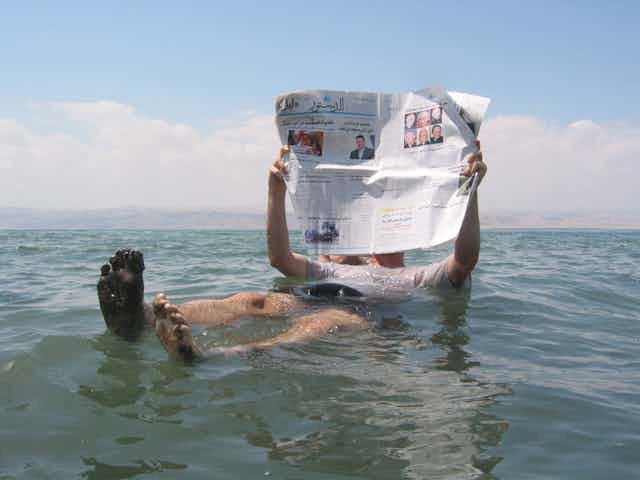Peer review is an essential part of science. Journal editors recruit scientists to provide expert opinion on manuscripts submitted by other scientists. Reviewers are expected to identify major errors and determine if an article presents new and significant science.
And while peer review is essential, it can fail.
Peer review prevents many, but not all, substandard articles from being published. Such failures are usually annoying but inconsequential, as poor quality articles are generally ignored. But when peer review fails on an article with contentious conclusions, this failure can be amplified by bloggers, the media and political campaigns.
Alberto Boretti’s paper on sea level rise near Sydney – which was published in the journal Coastal Engineering in June 2012 – is one such failure.
This week, Coastal Engineering has published a commentary in which we discuss major flaws in Boretti’s paper, some of which would be unacceptable in an undergraduate lab report.
Despite these flaws, Boretti’s conclusions were reported uncritically in the Australian Financial Review, Quadrant Online, The Australian and by Andrew Bolt over the past year.
How did this happen?
Sea level rise
Sea levels are rising in response to climate change and this will have an impact on coastal communities. A 10cm rise in sea levels roughly triples the number of flooding events at a given location.
During the 20th century, sea levels around Australia rose by around 10cm. That rise was not smooth and steady, as sea level rise is influenced by both climate change and natural variability (including the El Niño–Southern Oscillation).
Sea level rise is expected to be faster this century than last century, as a result of climate change. Currently, global sea levels are rising at 3mm a year but this will increase in the coming decades.

What went wrong?
Alberto Boretti has fitted curves to tide gauge data downloaded from archives. This is not particularly original and bloggers do this all the time. It only takes minutes to do.
But Boretti’s analysis contains major flaws. He assumes sea level rise accelerates with a constant rate but, as we’ve already mentioned, sea level rise accelerates and decelerates due to natural variability and climate change. Boretti therefore assumes, incorrectly, that observed accelerations during the 20th century will tell us how sea level rise will accelerate this century.
Boretti also ignores the uncertainty in measurements of acceleration; an uncertainty which again stems from natural variability. This means that relatively short (e.g. 20-year) tide gauge and satellite records also provide limited information with which to validate modelled accelerations.
Models summarised by the IPCC Fourth Assessment Report (AR4) indicate an overall rise of between about 20cm and 80cm over the 21st century. Boretti claims model projections are inconsistent with observed sea level rise near Sydney.
We have checked this, and find there is no statistically significant difference between the accelerations shown by the models and the data for the past 20 years.
Even if these flaws could be ignored, Boretti’s claims don’t match his own analysis. He concludes:
The most likely rise of sea level in the bay of Sydney by 2100 is therefore more likely less than the 50mm measured so far over the last 100 years rather than the metre predicted by some models.
However, Boretti’s fitted curve shows 78mm of sea level rise, not 50mm. There is no supporting evidence for Boretti’s conclusion that sea level rise will be less than 50mm by 2100.

As mentioned, Boretti’s paper on sea levels near Sydney found its home at Elsevier’s Coastal Engineering. Most sea level experts don’t publish in Coastal Engineering, nor do they usually publish in Natural Hazards (Springer) or Ocean & Coastal Management (Elsevier), which have also published articles by Boretti.
Boretti’s other papers have similar flaws, such as erroneous assumptions and no error analyses, so one has to wonder if they were scrupulously reviewed by experts.
Amplification
Boretti’s claims have been used uncritically by bloggers and the NC-20 political campaign in the US. Of course, bloggers and politicians can be both partisan and ignorant of the science, so their use of Boretti’s claims isn’t surprising.
But how did the mainstream media report Boretti’s claims?
On March 19 2012, Andrew Bolt wrote on his blog: “No, our sea levels aren’t accelerating as they claimed”. On April 16 2012, the Australian Financial Review ran a story by Mark Lawson titled “Sea height increases underwhelming”.
What went wrong?
When science reporters discuss new studies and their claims, they usually seek expert commentary. Is the paper as significant as claimed in the press release or by blogs? What are the implications of the study? Are there good reasons to doubt the results?
Australia has significant expertise in the science of sea level rise. However, you won’t find any expert commentary on Boretti’s claims in The Australian Financial Review, Quadrant Online, The Australian or Andrew Bolt’s Blog. (Some articles quote experts on sea level rise, but not on Boretti’s specific claims.)
To make matters worse, Andrew Bolt’s Blog and The Australian’s Cut & Paste juxtaposed Boretti’s bogus claims with the conclusions of more rigorous studies, such as those of CSIRO scientists. In doing so, the journalists created an illusion of controversy, using Boretti’s sloppy pseudoscience to undermine real science.
The faith of the media in Boretti seems particularly strange given his lack of expertise. Sure, he’s an Associate Professor … but with expertise in car engines, not sea levels.
Unfortunately the media’s faith in Alberto Boretti (who has changed his name to Albert Parker) isn’t as strange as it should be. Some journalists have given up critically analysing claims that support their agenda … even if that means relying on pseudo-scientists who turn 78 into 50.

